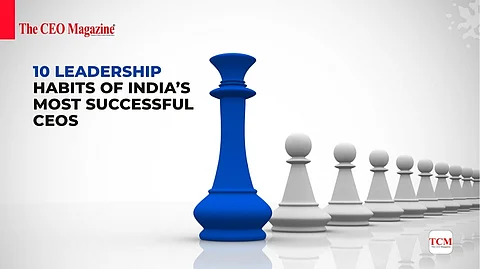
- News
- Women
- Magazine
- IndustryIndustry
- InsightsInsights
- Success Stories
- PublishPublish
- ContactContact
- Media KitMedia Kit

Let me ask you something:
What’s the difference between a good CEO and a great one?
It’s not just intelligence, strategy, or funding. It’s the habits. The tiny decisions and disciplines practiced daily.
In my experience interviewing and learning from top-tier business leaders — from Ratan Tata to Natarajan Chandrasekaran — one truth stands tall:
Success leaves clues, and leadership is a habit.
So, if you're a founder, business owner, or aspiring CEO, let me show you how India’s most successful CEOs think, act, and lead. You’ll walk away with actionable insights you can adopt starting today.
The best CEOs I’ve met don’t just chase quarterly numbers — they paint a vision of the future that inspires their teams.
“I don't believe in strategies that are reactive. We need to build for the future, not just for today.” — Sundar Pichai, CEO, Alphabet Inc.
They align every stakeholder — from board members to interns — with the big picture.
They communicate that vision repeatedly, in different forms.
And they back it up with long-term strategic planning.
Takeaway: Don’t just set goals. Create a compelling “why” that energizes your company.
Mukesh Ambani didn’t build Jio into a telecom giant by focusing only on profit margins. He obsessed over customer experience, offering data at unbeatable rates and reshaping India’s digital economy.
Great CEOs listen more than they speak — especially to customers.
They read customer reviews.
They personally call clients.
They walk the floors and observe how users interact with their product.
Ask yourself:
“Am I deeply connected to what my customer is feeling?”
Here’s the truth — you’re only as good as your team.
CEOs like N. R. Narayana Murthy (Infosys) invested in building cultures of trust, accountability, and ownership.
They don’t micromanage.
They hire slow, but fire fast.
They mentor top talent and celebrate collective wins.
“Our assets walk out of the door each evening. We have to make sure they come back the next morning.” — Narayana Murthy
Leadership Habit: Spend more time grooming your leadership pipeline than managing your inbox.
In fast-moving markets, indecision is more dangerous than a wrong decision.
Take Kiran Mazumdar-Shaw, the founder of Biocon. She took bold bets in biosciences when India’s pharma space was nascent. She faced skepticism — but her courage to act early paid off massively.
Speed doesn’t mean recklessness. It means:
Quick testing
Learning from feedback
Pivoting fast
Reflect: When was the last time you acted decisively on an idea that felt risky?
Every top CEO I know is a voracious learner. They read daily, attend industry forums, and are hungry for new ideas.
Satya Nadella turned around Microsoft by fostering a “learn-it-all” culture instead of a “know-it-all” one.
“Be passionate and bold. Always keep learning. You stop doing useful things if you don't learn.” — Satya Nadella
Make continuous learning a non-negotiable part of your calendar.
A burnt-out CEO is a liability. Period.
Anand Mahindra, despite his packed schedule, emphasizes health, family, and reflection.
Morning walks
Quiet time for thinking
Boundaries on work hours
These aren’t luxuries. They are leadership essentials.
Think about it: If your mind is cluttered, how can you think strategically?
Successful CEOs stay ahead of the curve, not behind it.
From leveraging AI and automation to adopting data-driven decision-making, leaders like Sanjiv Mehta (HUL) and Deepinder Goyal (Zomato) use tech not just as a tool — but a competitive advantage.
Explore new SaaS tools
Attend tech summits
Make data a core of every business decision
Pro tip: Your next competitive edge could come from technology you haven’t explored yet.
A CEO’s job is not just to make decisions — it’s to rally people around them.
Leaders like Ratan Tata are masters at storytelling — whether in boardrooms, interviews, or IPO roadshows.
“None can destroy iron, but its own rust can. Likewise, none can destroy a person, but his own mindset can.” — Ratan Tata
Storytelling:
Builds trust
Inspires teams
Sells vision to investors
Tip: Craft a compelling narrative about your business that people want to believe in.
Even with global empires, great CEOs never lose touch with the ground reality.
Dr. Pawan Goenka, former MD of Mahindra & Mahindra, was known to personally visit factories and dealerships to get unfiltered feedback.
They visit plants, retail stores, customer homes.
They listen without filters.
They act on insights, not egos.
Ask yourself: When was the last time you stepped outside the boardroom to see your business from the front lines?
India’s best CEOs are not just business leaders — they are nation builders.
From Azim Premji’s education philanthropy to Nandan Nilekani’s role in Aadhaar, these leaders use their success to create social impact.
This builds legacy. Trust. And deeper meaning.
“Success is not about how much money you make. It’s about the difference you make in people’s lives.” — Azim Premji
Find a cause that aligns with your values. Lead with heart, not just head.
Imagine this — you, five years from now, leading a high-impact organization, with a culture that thrives, customers that love you, and a team that grows with you.
It doesn’t happen by chance. It happens by building daily leadership habits — the same ones India’s top CEOs live by.
So here’s my challenge to you:
Pick 2–3 habits from this list.
Practice them consistently for the next 90 days.
Watch how your leadership — and your business — transforms.
Because leadership is not a title. It’s a daily choice.
Follow us on Google News
